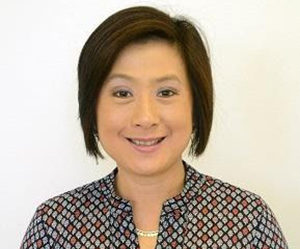 As an Asian American whose growing up years were in Singapore and who still has family roots there, I was curious – and somewhat skeptical – about the film “Crazy Rich Asians.” My husband, Paul, is a Baptist missionary kid who also grew up in Singapore, so that heightened our interest in a movie filmed in our “hometown.” Singapore is where we met, where I found my faith through the work of Baptist missionaries, where we both experienced beloved community and where we were engaged.
As an Asian American whose growing up years were in Singapore and who still has family roots there, I was curious – and somewhat skeptical – about the film “Crazy Rich Asians.” My husband, Paul, is a Baptist missionary kid who also grew up in Singapore, so that heightened our interest in a movie filmed in our “hometown.” Singapore is where we met, where I found my faith through the work of Baptist missionaries, where we both experienced beloved community and where we were engaged.
I wasn’t expecting much from the movie, but I was surprised at the emotional roller coaster ride it took us on. Most of it was filmed in Singapore, with some scenes in neighboring Malaysia. The sights, sounds and “tastes” of familiar places and foods flooded our minds with treasured memories. The church called “CHIJMES,” where the multimillion-dollar wedding occurred, was the Convent of the Holy Infant Jesus, an all-girls high school I attended. I have funny memories of nuns taking out their measuring sticks to measure from the knees to the bottom of the skirt to make sure our skirts were not too short. (Being a rebellious teen with budding seeds of feminist values, I failed that test many times.) Raffles, the colonial-style, luxury hotel where the main characters Rachel and Nick stayed, has the best high tea ever. Newton Food Court is one of the oldest, open-air hawker centres in the city state. I have fond memories eating delicious local foods there with family and friends. I could name every food featured in the film, making my movie popcorn blander by the minute.
“What I found especially moving was the sensitive portrayal of the delicate cultural challenges the couple faces.”
Like most rom-coms, some characters and events were exaggerated. But what I found especially moving was the sensitive portrayal of the delicate cultural challenges the couple faces. Nick, having lived in America, finds himself pulled between the Chinese culture of his family of origin and the Asian American culture of the woman he loves. Despite a shared ethnicity and language, Rachel, as a second generation Chinese American, experiences a rude awakening in the wide cultural divide that separates Nick’s family from hers. Nick’s mother, Eleanor, sums it up in a statement in Chinese translated to mean “You are not our kind.”
The couple’s struggle to balance cultural differences and their love for each other hit close to home for Paul and me. We remember clearly our long, two-year engagement while waiting for my parents’ blessing. I laughed hard and cried hard throughout the movie.
 There is a brief but significant scene toward the beginning where Eleanor is conducting her women’s Bible study. It is noteworthy that Christianity is the religion of the wealthy in Singapore. Megachurches there are experiencing the challenges related to wealth and greed. The Bible passage Eleanor reads aloud is from Colossians: “So if you have been raised with Christ, seek the things that are above…. Set your minds on things that are above, not on things that are on earth.” The irony is too clever for it to be random. Ultimately, the façade of wealth, beauty and even cultural heritage is fleeting. We learn that Eleanor herself experienced the sting of never “measuring up” despite how wealthy, refined and successful she was. It takes the sacrifice of someone from a different culture to help her “seek the things that are above.”
There is a brief but significant scene toward the beginning where Eleanor is conducting her women’s Bible study. It is noteworthy that Christianity is the religion of the wealthy in Singapore. Megachurches there are experiencing the challenges related to wealth and greed. The Bible passage Eleanor reads aloud is from Colossians: “So if you have been raised with Christ, seek the things that are above…. Set your minds on things that are above, not on things that are on earth.” The irony is too clever for it to be random. Ultimately, the façade of wealth, beauty and even cultural heritage is fleeting. We learn that Eleanor herself experienced the sting of never “measuring up” despite how wealthy, refined and successful she was. It takes the sacrifice of someone from a different culture to help her “seek the things that are above.”
Indeed, the mahjong scene, in which Rachel sacrifices her winning tile to Eleanor, is critical on many levels. Rachel finds her rightful place straddling both worlds, and Eleanor’s heart is opened to the power of love to bridge a cultural divide. I felt Eleanor’s heart, just like I felt my mom and dad’s hearts when I told them I wanted to marry Paul, a poor, Caucasian missionary kid. The emerald ring made me cry because it reminded me of the letter of blessing my parents wrote that was read aloud at our wedding.
Near the end, Nick’s grandmother, the Chinese matriarch of the story, says to her granddaughter that “family never has to say thank you.” At that point, Paul leaned over to me and said, “Your dad told me that.” I smiled at that memory because it was a sign of my dad’s full embrace of Paul and of us. There’s redemption in all of that.
One criticism I have of the movie is the title. “Crazy Rich Singaporean Chinese” would have been more accurate, because there are many other Asians in Singapore. The only Asians in the film are the Sikh guards and Filipino maids, which is not a fair representation. In Singapore, the celebration gatherings that were full of Chinese in the movie would have included all kinds of Asians, such as Malays and Indians. Singapore is a multi-ethnic culture (one of the reasons the food is so good) with four national languages.
If you’ve seen the movie and are fascinated by Singapore, I highly recommend a visit. It will be a trip you will remember. But don’t expect to stay at the Raffles Hotel or the Marina Bay Sands, the swanky hotel with the SkyPark, infinity pool and observation deck. Unless, of course, you are a crazy rich American – in which case, I will happily be your personal tour guide!
